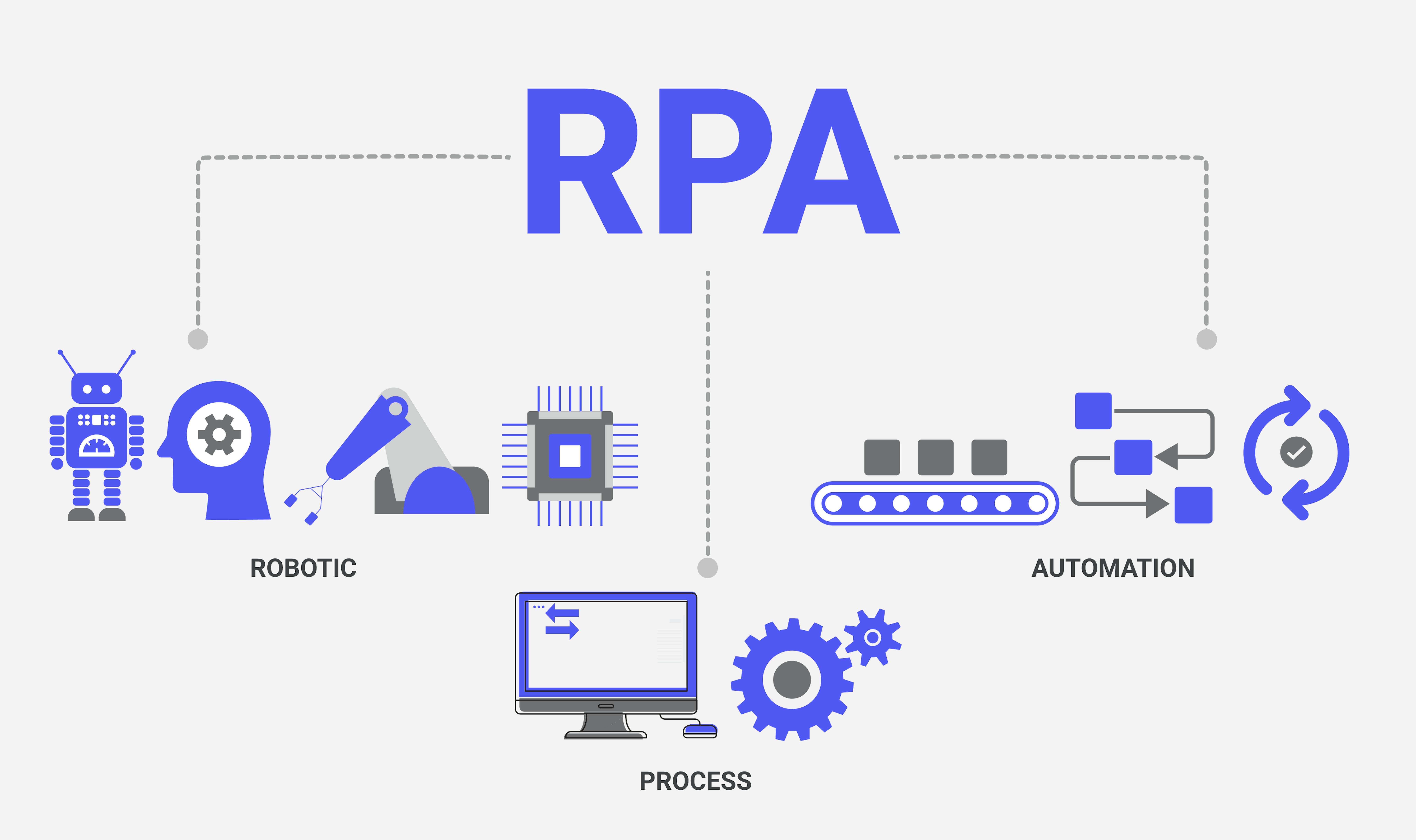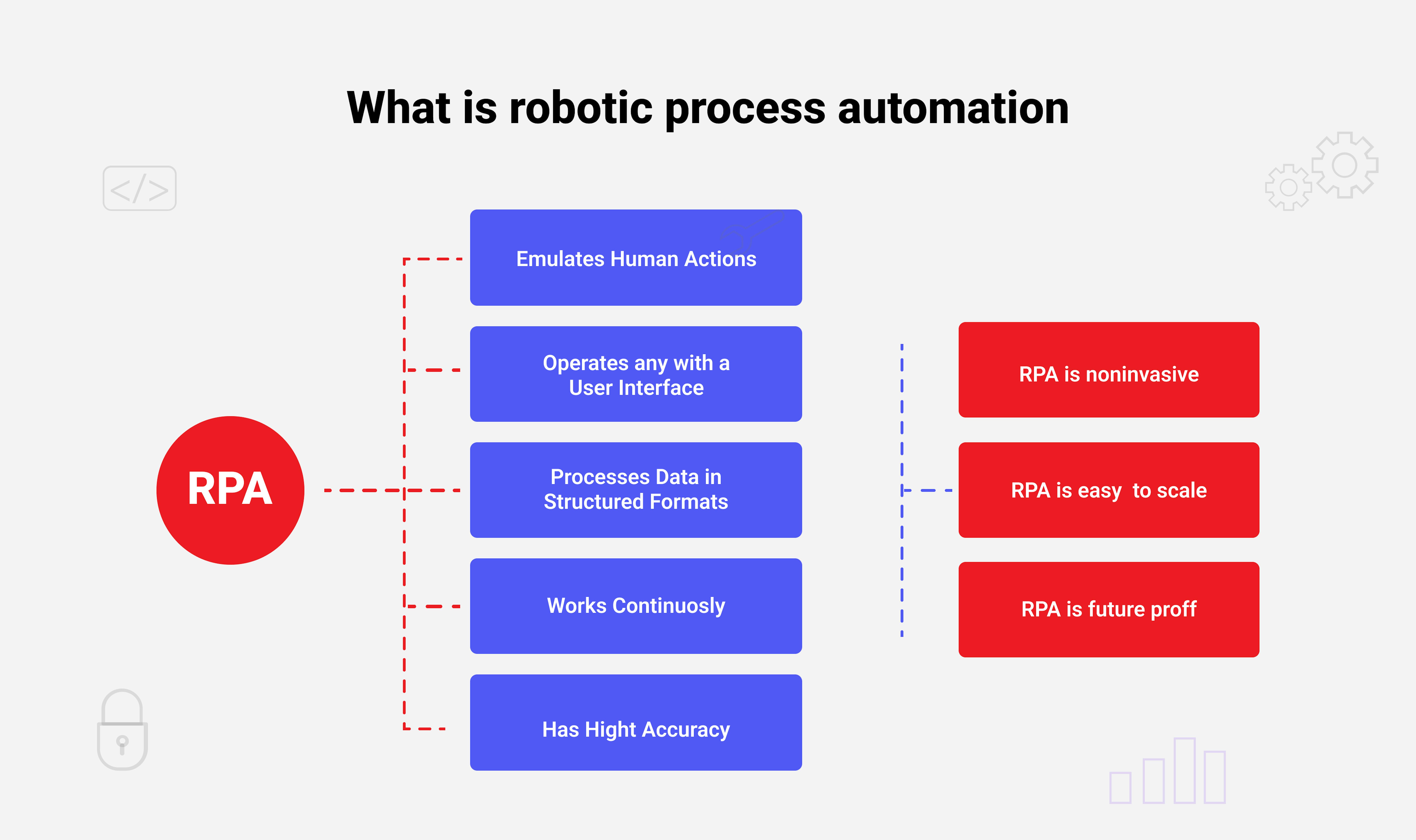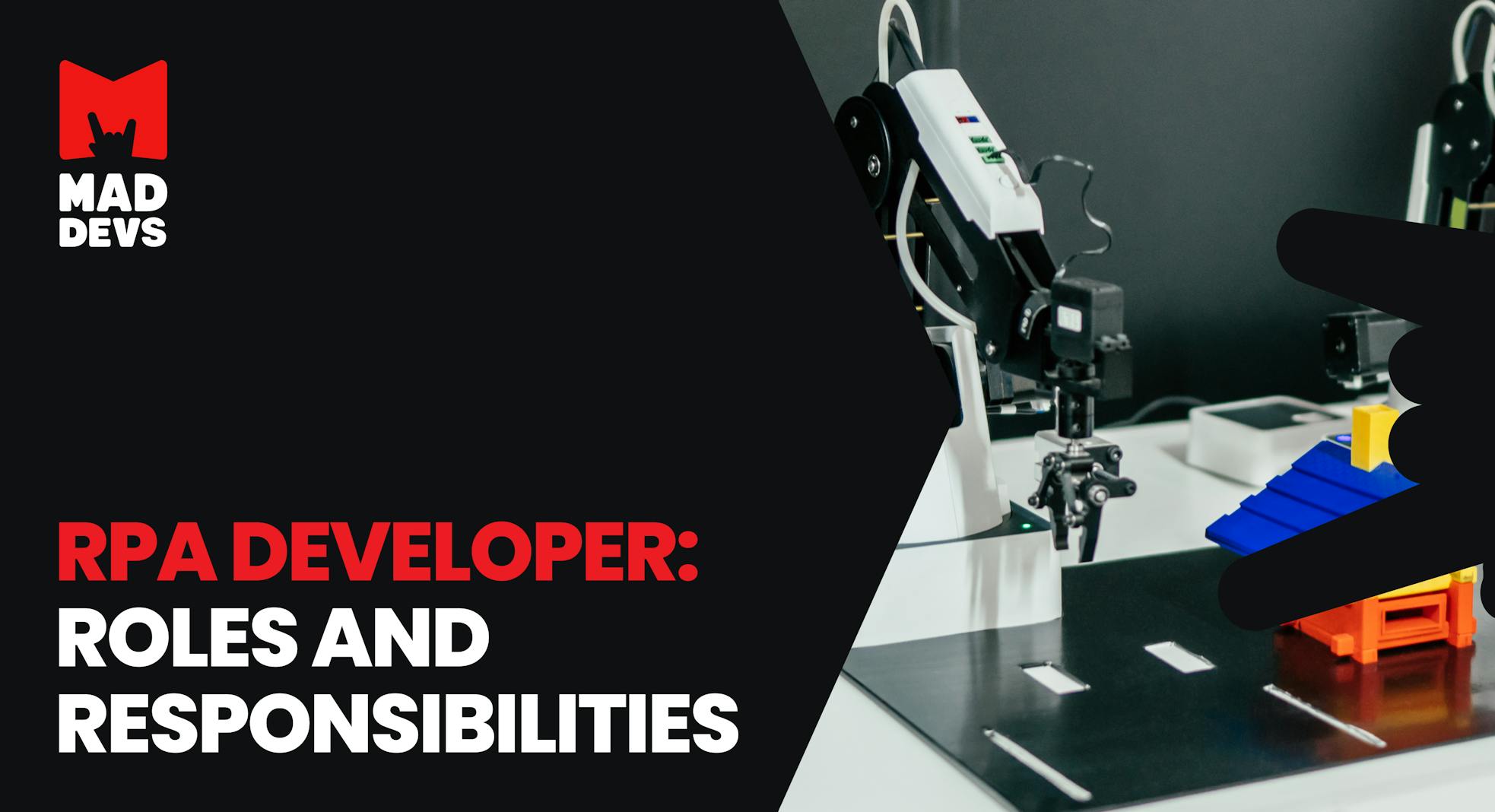Have you ever received an email notification for buying a product or, maybe, a job application submit approval? Then, you might be exposed to the concept of robotic process automation. The process that enables software robots to perform various tasks, such as filling out forms and sending emails, without requiring special skills or training made RPA one of the fastest-growing industries in today's world. Therefore, such a new profession RPA developer has become very relevant. In this article, we'll discuss the duties and responsibilities of this role, as well as the various skills needed to become an RPA developer.

But first, let's take a look at what RPA is and how it works.
RPA in nutshell
Robotic Process Automation (RPA) is a technology application that enables businesses to automate processes using software bots. The bots can capture and interpret business logic and respond to various digital systems.
Perhaps you might have a question: Since this is related to data collection, training against this, and task automation, why not use such popular technologies as AI and ML? Yes, RPA, AI, and ML are three key technologies leading the charge and working towards a common goal: making our lives and work easier. In this article, we provide key differences between them and use cases.

According to Precedence Research, the global robotic process automation market size is projected to hit around USD 23.9 billion by 2030 and is poised to grow at a compound annual growth rate (CAGR) of 27.7% from 2021 to 2030. The benefits and capabilities of RPA drive this growth.
Now that we have covered the basics, we can move on to who this employee is RPA developer.
What is the work of an RPA developer?
An RPA developer is a cross-functional individual who works with business analysts to create and implement automation processes. Many organizations have formal titles for this position, like Process Designer or Automation Architect.
The main duties of an RPA developer are to develop and implement software robots to enhance the efficiency of business processes. On the job, the developer works with various people from various industries to develop effective software that can handle mundane tasks.
The responsibilities of an RPA developer can be split into two phases: the first involves the participation in analysis and design of automation solutions, and the second involves the development of bot, testing, and maintaining the entire ecosystem.

Let's look close of these two big parts.
Business analysis
This stage is where the RPA developer works closely with the management of the company, like the developer manager or project/product manager. He participates in:
Problem Identification. One of the goals of an RPA developer is to identify and implement processes that can be automated. This involves analyzing a company's existing operations and identifying areas where the software can improve productivity.
Requirements gathering. It is the stage of the project is where the developer conducts interviews with the end-users to gather their feedback.
Documenting process steps. Developers are also involved in the development of off-the-shelf solutions, which can be easily adapted to handle different tasks. They then explore the possibility of integrating the existing systems into their own bot.
Market exploration. The development of a bot involves learning the steps involved in completing a task, and this helps the developer complete more work. By documenting the steps that a task requires, an RPA developer can easily complete the work and communicate with the team about the results.
The second part is more individual.
Development
Bot development. Developers usually start by designing and coding the software that will be used to complete the tasks. Some providers also offer tools that allow non-technical users to develop their own bots through visual scripting.
RPA ecosystem design. The complexity of the task and the type of robot that it uses will also determine the proper workflow for each type of robot. But the basic steps to design an RPA ecosystem are:
- Creation of user interface
A web or desktop app that lets users modify the bot's workflow, add new rules and interact with it remotely. - Training
After the robot has been installed on your server or computer, it receives instructions to perform a task. This process, which is called training, usually doesn't require any programming or complex software configurations. - Operation
After training bot can be operated in two ways:
When prompted to complete a task, attended RPA can trigger it or stop it. It does so by taking advantage of the changes in the flow of the task.
Unattended RPAs can run without human intervention. Most of the time, they are installed on a server or virtual machine and run in the background.
- Orchestration
In case multiple bots perform the same task, orchestration is required. It allows the user to launch or stop the bots and monitor their performance. - Choosing server
RPA developers should choose and use affordable physical or virtual servers to deploy software.
Testing and troubleshooting. Analyzing and troubleshooting issues is a part of the quality control process that an RPA developer is responsible for.
The quality of a software product impacts directly the brand reputation and influences client retention. Here is how we implement the quality assurance process in Mad Devs.
Process flow control. Each automation step follows a set of actions that the bot must perform in order to complete the task.
Deploy RPA components. Developers can also deploy automation software on their own devices. They can also help maintain the integrity of the system by monitoring its usage.
Supervising RPA development. The duties of an RPA developer include overseeing the development of the system and its various steps. This involves working with other developers to communicate the company's requirements.
In order to be successful in this field, the RPA developer will need to have a broad set of skills that are related to software development and business analysis.
RPA developer skills
Strategic plan skills. The ability to plan and execute a strategy for an RPA project is an integral part of this role.
Analytical skills. Being able to analyze and improve a process is very important. RPA developer has to identify opportunities to improve the overall efficiency of the work.
Problem-solving skills. Getting used to automation can be a bit challenging at first, especially since it can be prone to errors and bugs. Having the ability to debug a robot is essential for RPA developers.
Programming
Developers of RPA must have the necessary skills to develop software that can be easily integrated with the various processing machines of production. They must have high knowledge of the required programming languages like Python, Java, C, C++, etc., and their environments. They should also be able to identify the best platform for their work.
Due to the nature of the work that they do, developers must also have an understanding of the JavaScript source code, the DOM (Document Oriented Architecture), and HTML. The HTML tags are introduced in the dynamic web applications to enable the developers to easily identify the various components that are causing the problems.
The RPA developers should also be able to retrieve the data using SQL servers since they can easily understand the query strings. This will enable them to perform faster analysis.
Also, the developer should also have an understanding of the various automation tools that are included with the software. These tools can help improve the efficiency of the process. And, of course, knowledge of machine learning. Over the years, the concept of robotic process automation has evolved into cognitive automation. It combines the capabilities of artificial intelligence and machine learning. Since machine learning is a complex field, it makes sense to hire someone who has a strong background in this field.
Does RPA developer need coding?
Even though programming skills are necessary to become an RPA expert, non-programmers can also learn the various tools and techniques used by the industry. But remember, non-programmers are required to have the necessary skills to work in an operational department such as finance, sales, and production.
Most companies that are adopting RPA have standard solutions. As there are many out-of-the-box options, the position of an RPA developer is focused on implementing and maintaining the most popular ones:
These tools are no-code and can help capture business flows. They only need to be set up with simple business logic.
Moreover, these services provide certification and training for general RPA knowledge and basic experience with RPA infrastructure. Even though this certification is the easiest way to start a career in the field of robotic process automation, it requires no prior knowledge or experience in this technology. Additionally, it provides an opportunity to connect with industry experts.
What is RPA developer salary?
As mentioned, with digital transformation having an impact on every aspect of our lives, the demand for certified RPA developers is robust. Today, most companies pay high-end RPA developers. However, the salary range depends on the job role and the location.
According to Glassdoor:
- The national average salary for an RPA developer is $94,126 per year in United States.
- The national average salary for an RPA Developer is ₹500,000 in India.
- In Canada, an RPA developer's average salary is CA$73,080
- In UK, the average salary amounts to £39,610.
As you can see from above, due to the increasing number of companies using robotic process automation, the demand for skilled individuals with good RPA skills has led to salary increases in this field.
To sum up
Despite its popularity, the field of robotic process automation is still expected to grow. This is mainly due to the cost-savings that it can provide. One of the main advantages of using robotic process automation is that it allows employees to focus on more important tasks. It eliminates the need for manual work on tasks that can be automated.
Using robotic process automation can also help lower costs by reducing the number of people needed to complete certain tasks. With the increasing number of companies using robotic process automation, there are plenty of job opportunities in this field are also increasing.
Even people with limited expertise can quickly learn and implement the basic principles of robotic process automation.
We at Mad Devs unequivocally support this trend in business process automation and offer RPA services for you. Leave a request and we are ready to solve the problem of routine tasks in your company.









